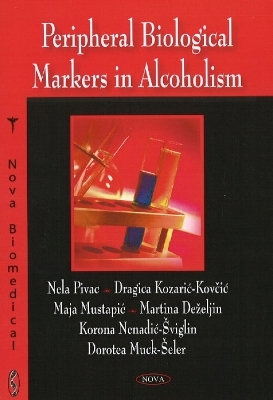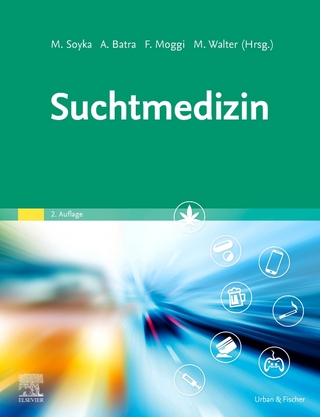
Peripheral Biological Markers in Alcoholism
Seiten
2008
Nova Science Publishers Inc (Verlag)
978-1-60456-617-8 (ISBN)
Nova Science Publishers Inc (Verlag)
978-1-60456-617-8 (ISBN)
Alcoholism is a complicated disorder that is often characterised with refractoriness to treatment, chronic course, high comorbidity and frequently with aggressive and suicidal behaviour. This title determines platelet 5-HT concentration and platelet MAO activity in the large groups of drug-free alcoholics.
Alcoholism is a complicated disorder that is often characterised with refractoriness to treatment, chronic course, high comorbidity and frequently with aggressive and suicidal behaviour. The neurobiological basis of alcoholism is assumed to be associated with the altered functions of different neurotransmitter (opioid, GABA, dopamine or serotonin (5-hydroxytryptamine, 5-HT)) systems. The association between central serotonergic function and the development and maintenance of alcohol abuse and dependence is based on the preclinical and clinical data, which show decreased 5-HT function associated with alcohol abuse. Peripheral biochemical markers might be used to improve the understanding of the underlying neurobiology of alcoholism, but also for the screening, establishing the diagnosis, disease staging, prediction of the suicidal risk and prediction and monitoring of treatment. Since 5-HT synaptosomes in the central nervous system and platelets similarly store, release and metabolise 5-HT, blood platelets have been widely used as a limited peripheral model for the central serotonergic synaptosomes. Various 5-HT abnormalities are frequently found in alcoholism, and decreased plasma tryptophan levels, decreased but also unaltered concentration of platelet 5-HT, increased platelet 5-HT uptake, and decreased and unchanged platelet monoamine oxidase (MAO) activity in alcoholic subjects have been reported. Deficits in central 5-HT function in alcoholic subjects were also detected after a challenge tests with fenfluramine, m-clorophenylpiperasine, and 6-chloro-2-1-piperazinylpyrazine, which resulted in blunted prolactin and cortisol responses. Alcoholism is frequently associated with different comorbid psychiatric disorders (personality disorder, PTSD, anxious-depressive disorder, major depression, schizophrenia), and with nicotine addiction. Clinical diagnosis of alcoholism was made according to the DSM-IV criteria, using Structured clinical interview and CAGE. Different clinical symptoms were evaluated using Hamilton Rating Scale for Depression and Anxiety. Control group consisted of drug free healthy persons with no personal or family history of alcoholism, who did not consume any alcohol beverage 24 h prior to sampling. All subjects fulfilled the questionnaire regarding their smoking habits. Biomarkers studied were platelet 5-HT concentration, platelet MAO activity, and routine laboratory tests, determined using spectrofluorimetric and photometric methods. Since platelet 5-HT concentration and/or MAO activity are under influence of sex, psychotic or depressive symptoms, suicidal behaviour, smoking status, or different psychiatric comorbid diagnoses, the authors determined platelet 5-HT concentration and platelet MAO activity in the large groups of drug-free alcoholics who were admitted into hospital due to the withdrawal syndrome related to alcohol dependency, and compared these values in the sex-matched healthy controls. They also investigated whether sex, smoking status, the presence of psychotic or depressive symptoms, suicidal behavior, number of cigarettes smoked per day, or different psychiatric comorbid diagnoses, would affect platelet 5-HT and MAO in male and female alcoholic patients. The data suggest that biological markers are very important research tool in alcoholism, since they can be used to determine the baseline characteristics of the alcoholic groups, to predict a suicidal risk in alcoholism, to predict efficacy in alcoholism treatment trials, to predict therapeutic response to medications in alcoholism, to measure alcohol consumption, and to be used in forensic toxicology.
Alcoholism is a complicated disorder that is often characterised with refractoriness to treatment, chronic course, high comorbidity and frequently with aggressive and suicidal behaviour. The neurobiological basis of alcoholism is assumed to be associated with the altered functions of different neurotransmitter (opioid, GABA, dopamine or serotonin (5-hydroxytryptamine, 5-HT)) systems. The association between central serotonergic function and the development and maintenance of alcohol abuse and dependence is based on the preclinical and clinical data, which show decreased 5-HT function associated with alcohol abuse. Peripheral biochemical markers might be used to improve the understanding of the underlying neurobiology of alcoholism, but also for the screening, establishing the diagnosis, disease staging, prediction of the suicidal risk and prediction and monitoring of treatment. Since 5-HT synaptosomes in the central nervous system and platelets similarly store, release and metabolise 5-HT, blood platelets have been widely used as a limited peripheral model for the central serotonergic synaptosomes. Various 5-HT abnormalities are frequently found in alcoholism, and decreased plasma tryptophan levels, decreased but also unaltered concentration of platelet 5-HT, increased platelet 5-HT uptake, and decreased and unchanged platelet monoamine oxidase (MAO) activity in alcoholic subjects have been reported. Deficits in central 5-HT function in alcoholic subjects were also detected after a challenge tests with fenfluramine, m-clorophenylpiperasine, and 6-chloro-2-1-piperazinylpyrazine, which resulted in blunted prolactin and cortisol responses. Alcoholism is frequently associated with different comorbid psychiatric disorders (personality disorder, PTSD, anxious-depressive disorder, major depression, schizophrenia), and with nicotine addiction. Clinical diagnosis of alcoholism was made according to the DSM-IV criteria, using Structured clinical interview and CAGE. Different clinical symptoms were evaluated using Hamilton Rating Scale for Depression and Anxiety. Control group consisted of drug free healthy persons with no personal or family history of alcoholism, who did not consume any alcohol beverage 24 h prior to sampling. All subjects fulfilled the questionnaire regarding their smoking habits. Biomarkers studied were platelet 5-HT concentration, platelet MAO activity, and routine laboratory tests, determined using spectrofluorimetric and photometric methods. Since platelet 5-HT concentration and/or MAO activity are under influence of sex, psychotic or depressive symptoms, suicidal behaviour, smoking status, or different psychiatric comorbid diagnoses, the authors determined platelet 5-HT concentration and platelet MAO activity in the large groups of drug-free alcoholics who were admitted into hospital due to the withdrawal syndrome related to alcohol dependency, and compared these values in the sex-matched healthy controls. They also investigated whether sex, smoking status, the presence of psychotic or depressive symptoms, suicidal behavior, number of cigarettes smoked per day, or different psychiatric comorbid diagnoses, would affect platelet 5-HT and MAO in male and female alcoholic patients. The data suggest that biological markers are very important research tool in alcoholism, since they can be used to determine the baseline characteristics of the alcoholic groups, to predict a suicidal risk in alcoholism, to predict efficacy in alcoholism treatment trials, to predict therapeutic response to medications in alcoholism, to measure alcohol consumption, and to be used in forensic toxicology.
Preface; Introduction; Methods; Results; Discussion; Conclusion; Acknowledgements; References.
| Erscheint lt. Verlag | 1.9.2008 |
|---|---|
| Zusatzinfo | Illustrations |
| Verlagsort | New York |
| Sprache | englisch |
| Maße | 215 x 140 mm |
| Gewicht | 206 g |
| Themenwelt | Medizin / Pharmazie ► Medizinische Fachgebiete ► Suchtkrankheiten |
| ISBN-10 | 1-60456-617-5 / 1604566175 |
| ISBN-13 | 978-1-60456-617-8 / 9781604566178 |
| Zustand | Neuware |
| Haben Sie eine Frage zum Produkt? |
Mehr entdecken
aus dem Bereich
aus dem Bereich
Buch | Softcover (2022)
Lambertus (Verlag)
27,00 €


